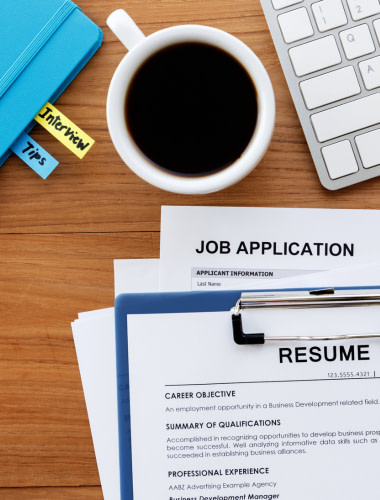
Struggling to write an effective resume?
Having spent years in the field of recruitment, I've seen countless job seekers miss out on great opportunities simply because their resumes did not effectively showcase their skills and accomplishments.
I have also noticed a trend - many of these candidates struggled to:
A resume is a crucial tool for job hunting, and it needs to make a strong impression on potential employers. Therefore, to overcome these struggles, candidates should take the time to improve their resume writing skills.

Keep your resume succinct
Throughout my career in recruitment, I've come to understand that there is not a one-size-fits-all solution regarding resume length. Rather, it varies depending on the country, industry, and specific job you're targeting.
Take, for instance, insight from the University of Adelaide. If you're looking for job opportunities in the US, they recommend keeping your resume to a single page, regardless of the role you're applying for. However, if you are looking for a job in Australia, they state that two to three pages is fine, as long as the additional length provides the reader with a better understanding of what you’ve been doing in your recent career.
The writers at SEEK offer an additional perspective. They recommend keeping your resume to one or two pages if you have less than a decade of professional experience. Conversely, if you have ten or more years of professional experience, are a senior executive, or if you work within academia, you may wish to have a resume spanning three pages or more.
Overall, there are no rigid rules regarding the precise length of your resume. Rather, the decision rests largely on your judgment and the specifics of your situation. Ultimately, what truly matters is that your resume is clear, concise, and memorable.

Tailor your resume
Your resume represents your opportunity to stand out to your potential employer by showcasing your skills and experience and highlighting why you may be a good fit for their vacancy.
Make the most of this opportunity by tailoring your resume to the specific role you are applying for. You can do this by aligning your skills and experience with the selection criteria outlined in the job advertisement.
Let's consider an advertisement that lists "demonstrated ability to regularly achieve sales KPIs" as a requirement of the job.
Instead of just describing your sales experience in your resume, you should detail your specific accomplishments. For example, you may write "consistently surpassed monthly sales targets, with an 80% customer retention rate, while bringing in 20% new business each month".
Taking this approach allows you to address the selection criteria in a way that provides your potential employer with tangible evidence of the value you could bring to their organisation.
If you'd like to read a more comprehensive guide on how to write a tailored resume, click the button below.

Select the right content & layout
There are several factors regarding content and layout that you should consider if you want to maximise the effectiveness of your resume.
Contact details
Your contact details should be easy for the reader to find. Display them at the top of the first page of your resume - either in the middle or in a sidebar to the left.
Your contact details should include your:
Profile statement
Including a profile statement at the beginning of your resume is beneficial, as it provides the reader with context, humanises your application, and sets the tone for the remainder of your resume. In your profile statement, you should:
Employment history
When it comes to showcasing your experience, lead with the most relevant information by presenting your employment history in reverse chronological order.
For each job, start by listing the job title, company name, website and location. You also need to include your dates of employment, responsibilities, and key achievements. As stated previously, make sure you include quantitative accomplishments to address the selection criteria in a way that provides your potential employer with tangible evidence of the value you could bring to their organisation.
Qualifications
Similar to your employment history, your education should be listed in reverse chronological order. Include any degrees, certifications, or licences you have attained, listing the title of the qualification, institution name and location, and your date of completion.
Referees
Lastly, as you approach the conclusion of your resume, you may be wondering whether you should include your referees. While they're undoubtedly valuable at a later stage in the application process, your referees' contact details do not belong in your resume.
By incorporating the elements I've discussed here, you can present yourself in a manner that resonates with prospective employers and improves your chance of securing a job.

Formatting matters
The formatting of your resume has a significant impact on its readability. Your prospective employer will appreciate a well-organised document that is easy for them to skim-read.
Line spacing
Increase the line spacing of your resume by highlighting the text, right-clicking, selecting "paragraph", and then changing the line spacing value to 1.2.
Page margins
According to Indeed, setting your margins to 2.5-3.5cm will ensure optimal readability. This might seem like a minor detail, but it will help prospective employers navigate your resume.
Headers & bullet points
Break up your resume by using headers and bullet points where relevant. This will make it far easier for prospective employers to skim-read.
Colour & creativity
While I tend to prefer a traditional black-and-white resume, I do recognise the role of creativity, especially for positions in fields like advertising or media. If you choose to add some colour, keep it tasteful and don't overdo it. Using a professional and neutral colour for headings is an excellent way to guide attention to different sections of your document.
Font type & size
When it comes to selecting a font, choose something simple, professional and legible like Arial in size 12. Fancier fonts tend to detract from the content itself.
Overall, a well-structured and thoughtfully designed resume will help improve the readability of your document while guiding your prospective employer's attention to the most important information.

Proofread & spell check
One common reason why hiring managers reject applications is the presence of spelling and grammatical errors.
One oversight that comes up frequently is the misspelling of the word 'Manager' as 'Manger'. It might appear as a simple mistake, but it can inadvertently cast doubt on your suitability, signalling a lack of attention to detail.
To ensure your resume makes a positive impression, I recommend enlisting the help of another person to review your document. Fresh eyes can catch errors that you might have overlooked.
Another pitfall to watch out for is the repetitive use of descriptive words. If you find yourself repeating the same words throughout your resume, you may want to use a thesaurus to add some variation. Tools like WordHippo and ChatGPT can be a great resource for finding synonyms and enhancing the overall quality of your writing.

Critical resume don'ts
Don't lie about gaps in your resume
Having gaps in your employment history can raise eyebrows if left unaddressed. Remember, every detail matters, and omitting dates or explanations might inadvertently imply that you have something to hide.
Don't share irrelevant information
Don't feel compelled to share irrelevant personal details. In Australia, employers are prohibited from asking about your age, marital status, religion, sexual orientation, or nationality. These factors don't define your professional capabilities and therefore have no place in your resume. However, your working rights are relevant.
Don't use an unprofessional email address
Presenting a professional image from the get-go is crucial. Using an unprofessional email address like [email protected] won't leave a good impression on prospective employers.
Don't include your referees
While referees are important later in the application process, they don't play a role in initially securing an interview. Therefore, you should hold off on including their contact details in your resume.


How to write a cover letter
Now that you know how to improve your resume, you may interested in learning how you can write a more effective cover letter. Click the button below to read my free e-book for some unique cover letter writing tips.

Are you looking for a job?
Now that you know how to improve your resume, you should take a moment to check our current vacancies page.
At 11 Recruitment, we have a range of white-collar temp and perm jobs available. We're always on the lookout for top talent to place with our clients, so we encourage you to apply for any positions that are of interest.
If none of our current vacancies are right for you, you should register for job alerts. Then we’ll be able to notify you when we receive a position that matches your profile.

What are your thoughts?
I'd love to have a conversation with you about this topic - please leave a comment below if you have any thoughts or opinions 🙂
Christian Madsen
Managing Director of 11 Recruitment























Another brilliant piece of advice. Thanks a bunch, Christian for this insights on writing an effective resume.
Hi Abraham, you’re most welcome. I’m glad you found the article valuable 🙂